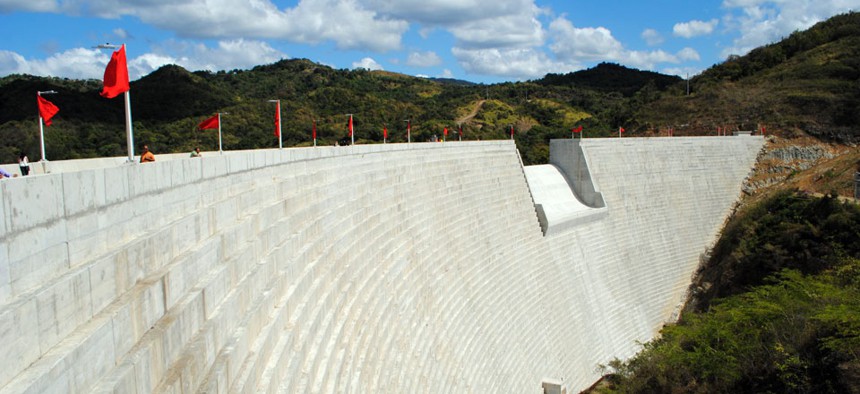NOAA Considers Whether to Ax Employee Accused of Breaching Army Dam Files

A view of the recently completed Portugues Dam. The dam, located near Ponce, Puerto Rico, is designed to reduce the impacts of flooding along the Portugues River. US Army
Hydrologist Xiafen Chen was arrested at work for supposedly stealing sensitive, restricted information on critical infrastructure.
National Weather Service employee Xiafen “Sherry” Chen was arrested Monday at her office in Ohio for allegedly breaching an Army database containing sensitive files on U.S. dams.
Now, the National Oceanic and Atmospheric Administration agency says it’s reviewing whether to take administrative action against the hydrologist, NOAA officials said Tuesday.
Federal charges against Chen include theft of government property and illegally accessing a U.S. government computer database.
While working at a Wilmington, Ohio, NWS facility in May 2012, she allegedly "did steal and purloin certain sensitive, restricted and proprietary computerized fields of data involving critical national infrastructure contained in the National Inventory of Dams database maintained by the United States Army Corp of Engineers," court papers state.
Chen is accused of having "intentionally exceeded authorized access" to the database, which means she likely did not break into the files, but rather downloaded information she obtained through her work privileges.
A two-page indictment unsealed Monday by the U.S. District Court for Southern Ohio does not state for what purposes she intended to use the information.
NOAA “is currently reviewing whether administrative action is warranted,” pursuant to applicable laws, rules and regulations,” NOAA spokeswoman Ciaran Clayton told Nextgov on Tuesday.
It was NOAA's security team that detected a violation and referred the case to the U.S. attorney's office, the official said.
U.S. authorities announced the case at a time when the Justice Department is cracking down on Chinese individuals who allegedly stole confidential data on behalf of China's People's Liberation Army. However, it should be noted, the indictment doesn’t state Chen’s nationality or link the alleged breach to any previous compromises.
Indictment Short on Details
In fact, what stands out to cybersecurity experts now is what the indictment doesn’t say.
"If you have an employee simply looking at a database of sensitive information, that's what we call a Tuesday -- it happens all the time,” said Mark Rasch, former head of Justice’s Computer Crime Unit.
He said he expects federal authorities in the future will allege the data breach was carried out on behalf of a foreign power, most likely China.
“They haven't said it,” he said. “That's the clear inference.”
The possibility of cyber espionage calls to mind a compromise of the same database, tied to the Chinese government, that started in January 2013 and continued into April 2013.
That event generated fear China was planning to conduct a cyberattack against the U.S. power grid, by disrupting the escalating amount of electricity generated by hydroelectric dams, the Washington Free Beacon reported in May 2013.
Dams listed in the registry are ranked by the number of people who would die if the infrastructure fails, according to the Army. Restricted fields of data include the "Nearest City/Town," "Distance to Nearest City/Town” and "Downstream Hazard Potential," among others.
“The U.S. Army Corps of Engineers is aware that access to the National Inventory of Dams (NID), to include sensitive fields of information not generally available to the public, was given to an unauthorized individual in January 2013 who was subsequently determined to not have proper level of access for the information,” an Army spokesman told the Free Beacon at the time of that breach.
When federal officials questioned Chen about her activities in June 2013, she denied logging into restricted areas of the inventory to access data concerning critical national dam infrastructure, the indictment states.
Prosecutors said this was an attempt to “willfully make a false representation,” according to court documents.
FBI Won't Say if Incidents Are Related
On Tuesday, FBI officials declined to comment on whether Chen's activities are related to the 2013 incident.
"We really can't say anything beyond what is contained in the indictment," Todd Lindgren, FBI spokesman for the Cincinnati division, told Nextgov. "More may come out during the court proceedings."
The dam database infiltration reported last year might have been part of larger agenda, researchers say.
"What we typically see in areas of Chinese espionage is they will try multiple mechanisms to get in," Rasch said. The doorway could be cracked open by nabbing login credentials with spyware or by persuading an employee with access privileges to share data.
The two incidents "may or may not be part of the same concerted effort,” he added. “There has been a history of employees at U.S. companies being paid by the Chinese government to obtain information for China," including Chinese researchers in the United States and workers at manufacturing plants.
Other private cyber analysts described this latest case as reminiscent of compromises they personally have traced to China.
"National dams are a critical infrastructure that our enemies would love to get intelligence on that they could leverage in case of a military conflict," said Dmitri Alperovitch, co-founder and chief technology officer at cyber forensics firm CrowdStrike.
While the indictment does not specify her affiliation with a foreign power, “it certainly can’t be ruled out,” he said. “We’ve seen cyber intrusions from China going after similar data."
NEXT STORY: Staples Registers Hacked by Credit Card Thieves






